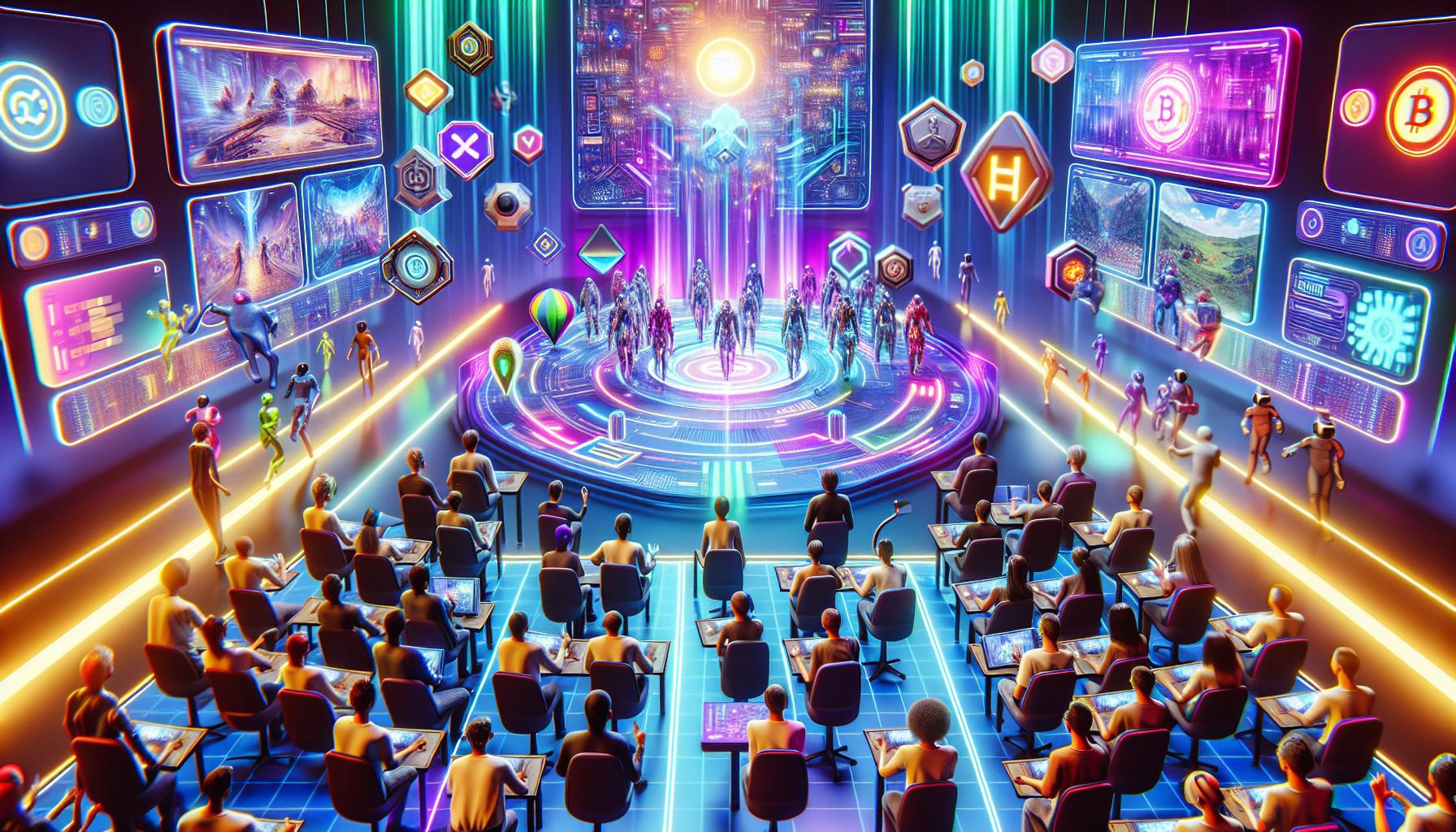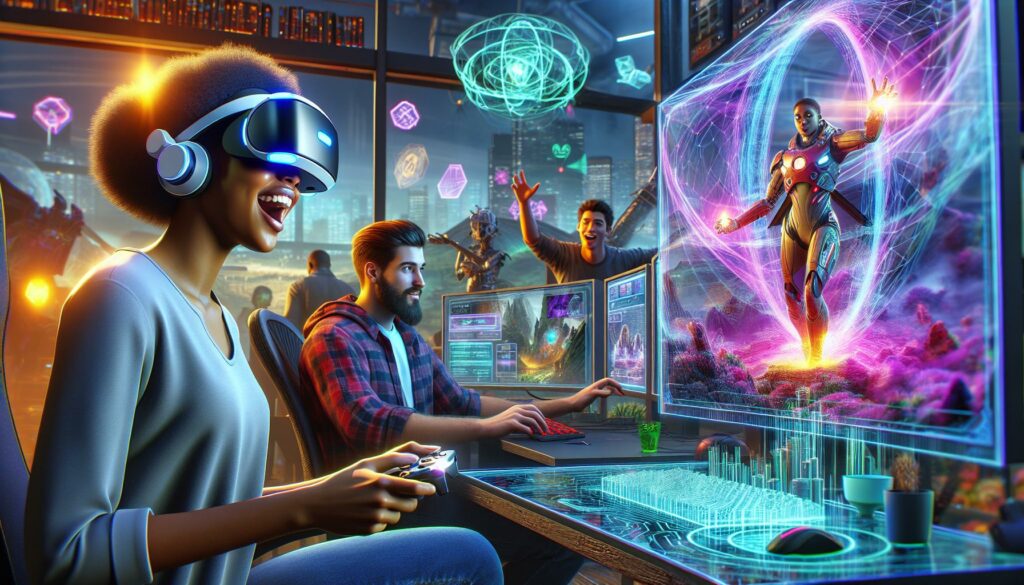In a world where gaming isn’t just a pastime but a thriving ecosystem, tech gaming defstartups are leading the charge. These innovative companies are shaking up the industry, blending cutting-edge technology with the thrill of gaming. Imagine a place where your wildest gaming dreams meet the latest in decentralized finance. Sounds like a gamer’s paradise, right?
As players dive into immersive worlds, they’re also stepping into a new era of financial empowerment. With defstartups, gamers aren’t just participants; they’re stakeholders in their own adventures. This isn’t just about leveling up; it’s about cashing in on those epic wins. So grab your controller and get ready to explore how tech gaming defstartups are rewriting the rules of engagement, one pixel at a time.
Tech Gaming Defstartup
Tech gaming defstartups represent a transformative force in the gaming industry. These companies leverage cutting-edge technology to enhance user experiences, integrating blockchain and decentralized finance elements into gaming frameworks. Players engage not just as consumers but also as stakeholders, sharing in potential financial benefits tied to their in-game achievements.
Innovative features such as play-to-earn models empower users, creating new avenues for profit. User-generated content enjoys increased prominence, as players contribute to game development and design. Furthermore, many tech gaming defstartups foster communities that prioritize collaboration, allowing players to connect and share strategies.
The rise of virtual assets impacts ownership, giving players more control over in-game items. Gamers can buy, sell, and trade these assets, leading to real-world economic opportunities. Investors notice this shift, fueling further growth in tech gaming defstartups, indicating a robust market potential.
Blockchain technology provides transparency and security, ensuring trust between players and developers. Decentralized governance models allow communities to influence game direction, creating a sense of ownership over shared environments. Emerging trends include non-fungible tokens (NFTs) that deepen player engagement, as users collect unique items tied to their identities.
Overall, tech gaming defstartups innovate on traditional gaming models, enhancing player experiences while promoting economic empowerment. By blending technology and gaming, these startups redefine engagement and revenue potential within the industry, confirming their pivotal role in the future of gaming.
Key Features of Tech Gaming Defstartup

Tech gaming defstartups showcase unique attributes that reshape industry standards. These features enhance player experiences and drive innovation.
Innovative Technology Integration
Advanced technology fuels the rise of tech gaming defstartups. Blockchain technology plays a critical role in ensuring transparency and secure transactions. Smart contracts automate processes, allowing for seamless interactions among players and developers. Additionally, decentralized finance empowers users to earn and trade virtual assets, creating economic opportunities. These elements collectively transform traditional gaming models into vibrant ecosystems. Players gain ownership and control over in-game items, which can be monetized beyond the gaming environment. Furthermore, as gamers engage with NFTs, they collect and showcase unique digital assets, enhancing their involvement in the gaming community.
Game Development Solutions
Tech gaming defstartups revolutionize how games are developed. Collaborative platforms enable players to actively contribute to game design and updates. Crowdsourcing ideas from the gaming community leads to more dynamic and engaging gameplay mechanisms. Involvement in decision-making processes fosters a sense of ownership among players. Decentralized governance allows communities to influence development priorities and game direction. Game finance also adapts, as capital for projects stems from player investments and participation. This approach leads to innovative gameplay experiences that resonate with the target audience. Ultimately, tech gaming defstartups create a more inclusive environment where players and developers grow together.
Market Trends and Analysis

Tech gaming defstartups are reshaping the landscape of the gaming industry. These transformations highlight significant trends that impact growth and competition.
Growth Potential in the Gaming Industry
The gaming industry is projected to reach $300 billion by 2025, showcasing immense growth potential. Tech gaming defstartups capitalize on play-to-earn models, attracting diverse demographics including casual gamers and crypto enthusiasts. Increased interest in virtual assets boosts engagement, giving players opportunities to monetize their gaming experiences. Blockchain technology enhances transaction security, further driving user adoption. Emerging trends like NFTs add additional layers of engagement, fostering unique interactions among players. These factors together solidify the industry’s trajectory toward unprecedented expansion.
Competitive Landscape
The competitive landscape contains a mix of traditional gaming companies and new tech gaming defstartups. Established firms face pressure to innovate and adapt to stay relevant. In contrast, startups leverage agility and cutting-edge technology to quickly capture market share. User-centric experiences become central, with companies seeking to enhance interaction and retention among gamers. The convergence of gaming with decentralized finance opens new avenues for revenue generation, attracting investment from both tech and gaming sectors. Overall, this environment presents opportunities as well as challenges, demanding that companies continuously evolve to maintain competitive advantage.
Case Studies of Successful Tech Gaming Defstartups

Successful tech gaming defstartups showcase innovation and transformation within the gaming sector. These companies demonstrate how advanced technology enhances user experiences and fosters community engagement.
Notable Examples
Decentraland stands out as a leading platform, enabling users to create, experience, and monetize content and applications in a virtual environment. Axie Infinity exemplifies the play-to-earn model, attracting players who trade and battle virtual creatures, thus generating significant revenues. Sandbox allows players to design experiences and earn through its NFT marketplace, promoting creativity. Finally, Sorare combines fantasy sports with NFT trading, enabling users to buy, sell, and trade officially licensed player cards.
Lessons Learned
Innovation drives success in the tech gaming defstartup space. Companies integrate blockchain technology to ensure secure transactions, creating trust among users. Community involvement makes a significant impact, enabling players to influence game direction and development. Monetization opportunities expand when players feel ownership over in-game assets. Remaining adaptable to market trends and user preferences enhances competitiveness and profitability. Lastly, learning from community feedback and adjusting strategies creates a sustainable growth model in the evolving landscape.
Challenges Facing Tech Gaming Defstartups
Tech gaming defstartups encounter several significant challenges that can impede their growth and potential.
Funding and Investment Issues
Securing adequate funding proves difficult for many startups in the gaming sector. Investment firms often hesitate to back projects that blend gaming with emerging technologies, given the perceived risks involved. Existing models may not align with traditional investment criteria, complicating funding efforts. Furthermore, convincing investors of long-term profitability can be challenging. Many startups also experience competition for attention among a crowded market of tech-savvy ventures. Established firms with stable funding widen the resource gap, making it hard for new entrants to thrive. Despite this landscape, successful examples illustrate the potential for innovative funding solutions through community-driven investments.
Regulatory Hurdles
Navigating regulatory frameworks presents another obstacle for tech gaming defstartups. Many jurisdictions lack clear regulations regarding digital assets, creating uncertainty for startups exploring blockchain integrations. Ambiguous laws can deter investors and stifle innovation as companies seek compliance. Moreover, the rapid pace of technological advancement outstrips existing legal frameworks, complicating governance and oversight. Different regions impose varied regulatory requirements, leading to inconsistent enforcement that can impact operational strategies. Despite these hurdles, proactive engagement with regulators fosters a better understanding of industry dynamics and protects against future challenges.
Gaming Landscape
Tech gaming defstartups are redefining the gaming landscape by merging advanced technology with player engagement. This shift not only enhances the gaming experience but also empowers players to take ownership of their in-game assets and participate in the development process. As these startups continue to innovate and attract investment, they pave the way for a more inclusive and rewarding gaming environment.
The rise of blockchain technology and decentralized finance opens new avenues for monetization and community involvement. While challenges like funding and regulatory hurdles persist, the potential for growth and transformation remains significant. By fostering collaboration and prioritizing player interests, tech gaming defstartups are set to play a pivotal role in shaping the future of the gaming industry.



